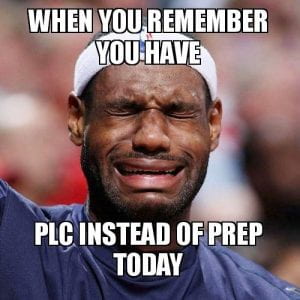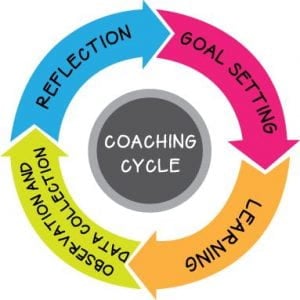Confession: teachers can be hypocritical.
We penalize students for late homework, but how many teachers have responded to parent emails past the 24-hour benchmark? Or submitted their SMART goal past the deadline? We fuss at students for being tardy to class, but who hasn’t walked into a meeting a few minutes late because they needed a bathroom break, fresh cup of coffee, or got caught up chatting with a colleague in the hallway? And faculty meetings…? We groan that students aren’t paying attention in class, having side conversations, or on their phones. Faculty meetings look very similar!
Fear not! I am NOT suggesting that we shouldn’t hold students accountable! Those that know me well, know that is the last thing I would suggest, but what I am suggesting is that the same best practices with students are also best practices with adult learners. Our students disengage from the work that they don’t feel has any meaning or value. They rush through essays or worksheets, “fake” their reading logs, and fudge their way through group discussions, clearly not prepared for the topic. As teachers, we get frustrated! Why don’t they see the importance of what we do?! Why don’t they see the potential for growth and learning if they put real effort into the task?!?!
Teachers do the same thing with PLCs. Yup. I said it.

Teachers halfheartedly go through the motions, answering the questions with as many buzzwords as possible, all the while joking that no one probably reads them. (*note – not ALL teachers or PLC meetings end up like this, but many do)
But it isn’t completely their fault. PLCs (in our division) have not been given their proper due. PLC meetings, when done right, have a HUGE impact on student learning. When teachers commit to really answering the four focus questions, there is power in the collaboration that follows.
What do we want students to learn?
Listing the standards isn’t the goal. Anyone can look up the standards from the state website and match them to the topic of the unit. The purpose is deeper than that here. What do you want students to know? What do you want students to be able to do with their knowledge? What do you want them to transfer into their daily lives? Really think about what you want your students to walk away from this unit knowing…because success in our world is so much bigger than SOL7.3a.
How do we want them to learn it?
Plan the learning targets THEN plan the activities. Activities are meant to be chosen carefully to provide the learning opportunity needed to achieve the learning targets. Really evaluate your lessons. Are they really supporting the learning targets, or are they just the same lessons you’ve always used. Use a critical lens in this discussion.
What will we do if they don’t learn it?
There are some students who just don’t “get it” the first time you teach it. They need to see it again. And again. And again…. If you’re always “reteaching” the material in the SAME way you delivered it the first time, you’re not RETEACHING, you’re REPEATING. This discussion calls for creativity. What have you tried that has failed? Let’s not use it again. What else could you try? Have you done stations? Small group instruction? Have you tried “flipping” your classroom, so they’re doing the instructional part at home via video, so you can provide targeted remediation during the block? Can you and your co-teacher team up and divide students into homogeneous ability groups? There isn’t one strategy that will work. And the same strategies you used last year, may not work for this year’s crew. You have to dig deep. But, aren’t our students worth it?
What will we do if they already know it?
MOST. UNADDRESSED. QUESTION.
Some kids walked into your classroom on Day 1, and could pass your SOL. That doesn’t make your job easier. In fact, it makes it harder. If that student could meet that benchmark before the end of first quarter, but didn’t “pass-advanced” on the end of the year benchmark – you failed them. I know that’s harsh, but it’s true. The educational system has become so fixated on meeting that passing level of performance, but that just means that the majority of our students knew about HALF of the content. HALF! We’re aiming for mediocrity! How are you going to push those higher level thinkers? Don’t punish them with more work, but give them a task that challenges them. Give them a project that will require them to extend themselves. Put them in charge of creating a remediation presentation, game, video, or handout. Let them use their knowledge to create something useful for someone else. These students are wasting away while we pat ourselves on the back for our “passing” scores.
Planning time is more valuable than gold. I get that. I know that teachers have duty, parent phone calls, papers to grade, IEP and 504 meetings, and so many other obligations. PLCs get added to the list of “let’s check the box and move along.” And you know what, someone may not come behind you and read the PLC notes you posted. But just like our students, we need to see the value in the task we’re being asked to do. Make your PLC meaningful. Watch student growth sky-rocket.
If I’m your Instructional Innovation Coach in the building, email me! I would love to come help your team find the value in PLC meetings. Let me help you use this time to enhance student learning instead of “checking a box.”




